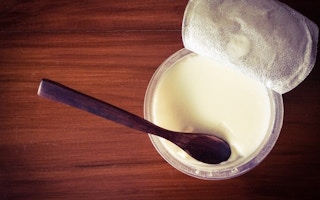Dairy Home, a leading dairy producer, has agreed to use bioplastics for all of its yoghurt packaging, in a deal struck with NatureWorks Asia Pacific, an affiliate of PTT Global Chemical.
Heralded as the first such deal sealed with an Asian dairy producer, the agreement marks significant progress in PTTGC’s aspiration to turn Thailand into a hub of the bioplastics industry in Asia.
Dairy Home managing director Pruitti Kerdchoochuen said he expected other leading dairy companies to follow his firm’s lead in using bioplastic packaging soon.
This is because the price gap between bioplastics and conventional polymers has been reduced to about 30 per cent, from some 300 per cent a few years ago, thank to PTTGC’s introduction of environmentally friendly bio-polymer products to the Thai market. The additional cost is now small when compared with the total production expenses, he said.
“
Utilising agricultural produce for bioplastics manufacturing will help add value to the country’s farm products, boosting farmers’ incomes, while we serve the needs of modern consumers who care and want to take part in environmental protection
Athavudhi Hirunburana, chief operating officer of PTTGC
Athavudhi Hirunburana, chief operating officer of PTTGC, said the launch of bioplastic packaging for Dairy Home’s organic yoghurt products was part of his firm’s strategy to become a chemical-business leader that pays serious attention to economic, social and environmental impacts.
Thank to its acquisition in 2001 of a 50-per-cent share of NatureWorks, the world’s leading bioplastics manufacturer that owns proprietary production technologies, PTTGC has become ready to introduce bioplastics to Asian markets as well as preparing to expand the manufacturing base to the region, especially to Thailand, which is a leading producer of many farm products, including sugar cane, that can be used as a raw material for bioplastics production.
“Utilising agricultural produce for bioplastics manufacturing will help add value to the country’s farm products, boosting farmers’ incomes, while we serve the needs of modern consumers who care and want to take part in environmental protection,” he said.
Dairy Home is one of only two dairy-product companies to receive official organic certificates in Thailand. The company will introduce bioplastic-packaged yoghurt late this month. It currently sells about 2.5 million yoghurt cups per year.
Pruitti said Dairy Home, which until recently sold its organic products only at higher-end supermarkets, had made more headway into the mass market, reflecting higher acceptance by mass consumers of pricier organic foods.
Dairy Home’s bioplastic-packaged organic yoghurt products are available at leading stores such as Jiffy, MaxValue, Tops Supermarket, Gourmet Market, Lemon Farm, Villa Market, Foodland, Isetan, Big C, and Tesco Lotus.
Viboon Pungprasert, general manager of NatureWorks Asia Pacific, said the firm’s bioplastic products marketed under the Ingeo brand were made 100 per cent from plants grown in the nature. While maintaining the same good quality as oil-based plastics, Ingeo’s “green chemicals” help reduce greenhouse gases and energy consumption by more than 50 per cent.
Ingeo polylactic acid (PLA) bio-polymers have been used by leading dairy firms such as Danone and Stonefield in Germany and the United States.
Pruitti said Dairy Home had been looking for organic packaging for some time because the firm wanted to become 100 per cent organic in both product and packaging aspects. But it could not achieve this until PTTGC and NatureWorks came in to help develop the bioplastic packages together with a local plastic converter firm, R&B Food Supply, last year.
Viboon said NatureWorks aimed to sell 500 tonnes of its PLA bio-polymers this year, up from just 20 tonnes when it began the marketing drive last year.

















